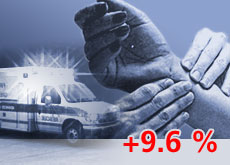Swiss to vote on cutting health care costs

High earners face exorbitant health premiums, under a proposed overhaul of the health insurance system, which is to go to a nationwide vote.
Parliament on Thursday gave the go-ahead for the vote to take place next year.
The super rich – such as the Swiss People’s Party’s Christoph Blocher – could see their monthly premiums rise to a whopping SFr85,000, according to the Zurich-based daily “Tages-Anzeiger”.
On Thursday, the House of Representatives rejected a Senate call to delay a vote until current health reforms had passed through parliament.
The Social Democrat-backed people’s initiative – “Health must remain affordable” – proposes linking the level of health insurance premiums to income and wealth – a move they claim would lead to a fairer distribution of the burden of health costs.
Switzerland is the only European country in which premiums are not based on the level of personal income.
Individuals of the same age and sex pay exactly the same price for the same healthcare coverage – regardless of income.
Distribution by stealth
But health law professor Dominique Sprumont argues that health insurance bills are indirectly related to earning power within the current system.
“The rich are paying more if you take into account the idea that they pay their taxes,” he told swissinfo. “With those taxes, the government – whether cantonal or federal – is paying for subsidies for the people who cannot afford to pay the full premium.”
Sprumont says that in some cantons as much as two-thirds of the population have their premiums subsidised.
Reform
Parliament is currently discussing a number of proposals to slash spiralling healthcare costs.
These include limiting the number of doctors, easing imports on cheaper drugs and reducing the number of services covered by mandatory health insurance.
Last week the Senate voted in favour of delaying a nationwide vote on the people’s initiative to link premiums to income.
Sprumont says many politicians fear the Swiss will vote “yes”, forcing the government to incorporate the proposals into any reform of health policy.
“The initiative is a social initiative,” he said. “It is responding to the demands and needs of the population to have some control on healthcare costs.
“The right and centre-right parties have no interest in going in that direction. Instead they would like to see more competition between insurers and healthcare providers to bring costs down.”
Compulsory cover
In October the government announced that basic compulsory cover was due to rise by an average of 9.6 per cent across the country next year.
It will be the second year running that the Swiss face a huge increase in their health insurance bills.
Healthcare costs in Switzerland are among the highest in the world. According to 1998 figures from the Organisation of Economic Cooperation and Development, they account for 10.4 per cent of the country’s Gross Domestic Product (GDP).
That puts Switzerland in second place behind the United States with 12.9 per cent of GDP.
swissinfo, Jonathan Summerton
Basic health insurance has risen by almost 30 per cent in Switzerland since 1996.
Switzerland is the only European country in which premiums are not based on the level of personal income.
Healthcare costs in Switzerland are among the highest in the world – they account for 10.4 per cent of the country’s Gross Domestic Product.
The Swiss face an average hike of 9.6 per cent for the cost of basic compulsory cover for 2003.

In compliance with the JTI standards
More: SWI swissinfo.ch certified by the Journalism Trust Initiative

You can find an overview of ongoing debates with our journalists here . Please join us!
If you want to start a conversation about a topic raised in this article or want to report factual errors, email us at english@swissinfo.ch.